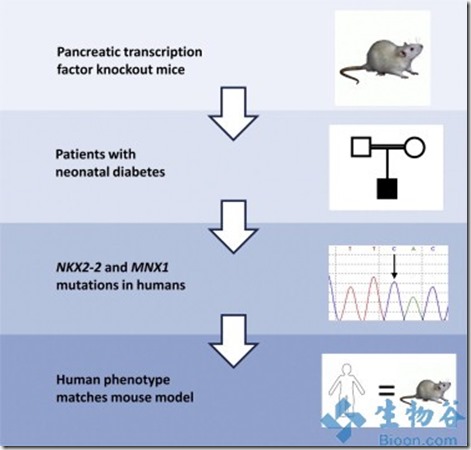【Cell Metab】科学家发现糖尿病的新致病原因
Cell Metab:科学家发现糖尿病的新致病原因
2014/01/09 22:06:18
Exeter Medical Schoo大学研究人员日前揭示了新生儿糖尿病的两个新的遗传原因。他们完成的这项研究发表在_Cell Metabolism_杂志上,进一步揭示了β细胞在胰腺中如何形成。

研究小组发现,对胰腺发育重要的两个特定基因的基因突变后,可引起新生儿糖尿病。这些发现将新生儿糖尿病的遗传原因数量增至20个。论文主要作者Sarah Flanagan表示:我们非常自豪能够给予参与研究的家庭解答,为什么他们的孩子有糖尿病。
新生儿糖尿病在孩子不到半岁时诊断,而其中一些患者增加了并发症,如肌肉无力和学习困难有或无癫痫。我们的新基因发现是关于β细胞在胰腺如何形成,这对研究操纵干细胞治愈疾病产生了重大影响。
研究英国糖尿病协会主任Alasdair Rankin说:除了进一步揭示新生儿糖尿病的遗传原因,新研究还提供答案给父母,为什么孩子会有这种罕见的疾病,这项工作有助于我们了解胰腺发育。
新生儿糖尿病是由影响胰岛素生成的基因发生变化引起的。这意味着,血糖在体内的水平危险性的升高。Exeter团队招募来自80多个国家的1200多名患者。这项研究集中在147名新生儿糖尿病的年轻人上,经过系统的筛选, 110例患者接受了基因诊断。
至于其余的37例患者,研究人员对人类胰腺发育的重要基因突变进行了筛选。突变发现在11名患者中存在,其中四个分别是两个基因NKX2- 2和MNX1(先前不知会导致新生儿糖尿病)中的一个。
对于其余121名(82%)接受基因诊断的患者,知道糖尿病的原因会导致得到更好的治疗,并给所有患者在将来怀孕时提供新生儿患糖尿病风险的重要信息。
Analysis of Transcription Factors Key for Mouse Pancreatic Development Establishes NKX2-2 and MNX1 Mutations as Causes of Neonatal Diabetes in Man
doi:10.1016/j.cmet.2013.11.021
Sarah E. Flanagan, Elisa De Franco, Hana Lango Allen, Michele Zerah, Majedah M. Abdul-Rasoul, Julie A. Edge, Helen Stewart, Elham Alamiri, Khalid Hussain, Sam Wallis, Liat de Vries, Oscar Rubio-Cabezas, Jayne A.L. Houghton, Emma L. Edghill, Ann-Marie Patch, Sian Ellard, Andrew T. Hattersley
Understanding transcriptional regulation of pancreatic development is required to advance current efforts in developing beta cell replacement therapies for patients with diabetes. Current knowledge of key transcriptional regulators has predominantly come from mouse studies, with rare, naturally occurring mutations establishing their relevance in man. This study used a combination of homozygosity analysis and Sanger sequencing in 37 consanguineous patients with permanent neonatal diabetes to search for homozygous mutations in 29 transcription factor genes important for murine pancreatic development. We identified homozygous mutations in 7 different genes in 11 unrelated patients and show that NKX2-2 and MNX1 are etiological genes for neonatal diabetes, thus confirming their key role in development of the human pancreas. The similar phenotype of the patients with recessive mutations and mice with inactivation of a transcription factor gene support there being common steps critical for pancreatic development and validate the use of rodent models for beta cell development.
Source from Bioon